 Petzlover
Petzlover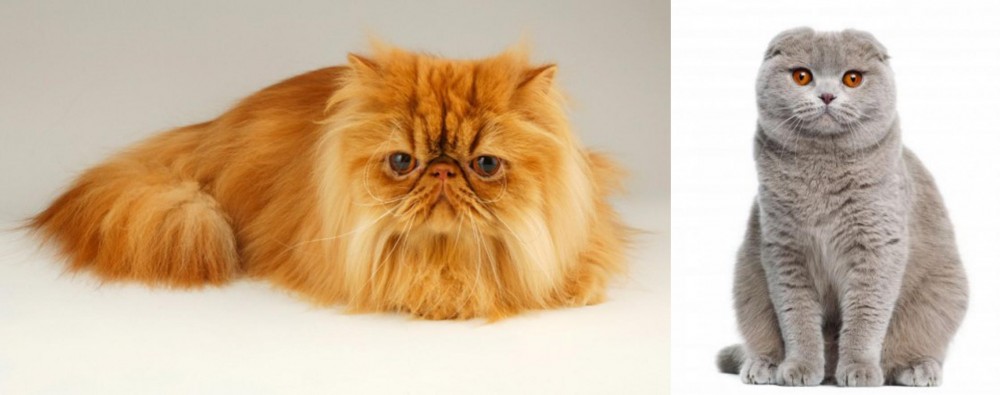 Persian is originated from Iran but Scottish Fold is originated from United Kingdom. Both Persian and Scottish Fold are of same weight. Persian may live 3 years less than Scottish Fold. Both Persian and Scottish Fold has same litter size. Persian requires Moderate Maintenance. But Scottish Fold requires Low Maintenance
Persian is originated from Iran but Scottish Fold is originated from United Kingdom. Both Persian and Scottish Fold are of same weight. Persian may live 3 years less than Scottish Fold. Both Persian and Scottish Fold has same litter size. Persian requires Moderate Maintenance. But Scottish Fold requires Low Maintenance
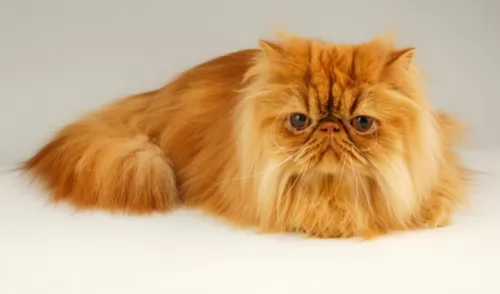 Cat lovers the world over know the Persian cat very well. It's a beautiful long-haired cat breed with its familiar round face and blunt muzzle.
Cat lovers the world over know the Persian cat very well. It's a beautiful long-haired cat breed with its familiar round face and blunt muzzle.
It is not really known when long-haired cats first appeared, or where the Persian originated but their history stems from Persia or Iran as it is known today, where it seems they were first sighted.
The cats were grey-coated and some were white and soon the cats arrived in Britain. They were introduced to the United States in the 1900s. The cat was developed first by the English, and then also by American breeders after the Second World War and the breeding of these cats has also meant a lot of coat colors.
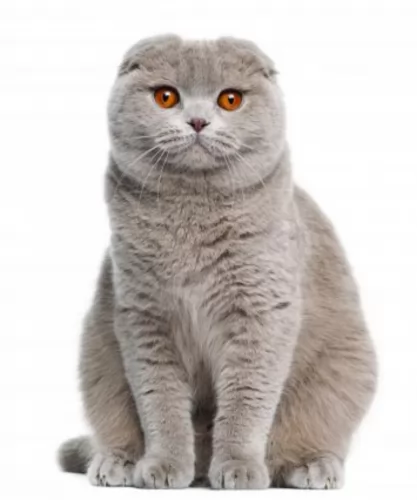 The Scottish Fold is a domestic cat that has an owlish look to it. This is because of the natural dominant-gene mutation that affects cartilage in the cat.
The Scottish Fold is a domestic cat that has an owlish look to it. This is because of the natural dominant-gene mutation that affects cartilage in the cat.
The ears of the Scottish Fold cat folds in a weird way so that the cat has an owl-like look to it. These cats are also known as Highland Fold and Coupari.
It seems that the first Scottish Fold was a white barn cat with the name of Susie. When Susie had kittens, there were a couple of them born with these folded ears. A cat fancier registered the breed in the United Kingdom and in 1966 started a breeding program. These cats were later exported to America.
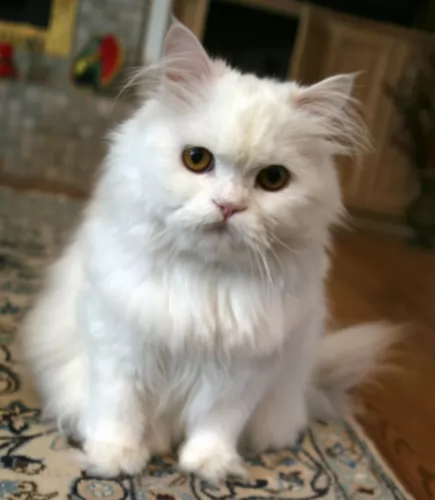 The Persian cat is a medium- to large-sized cat and is heavily boned. He can weigh between 3 and 6kg.
The Persian cat is a medium- to large-sized cat and is heavily boned. He can weigh between 3 and 6kg.
He has stocky legs, a thick neck, small ears, round head, round eyes, and the face is flat or blunt. The kittens are gorgeous balls of fluff.
The coat of the Persian is thick, long, and silky. People many times think only of a white Persian, when in fact the cat comes in many colors and patterns. Eye color for the cat can be blue, green, brown, copper or even odd-eyed.
The Persian isn’t the most active of cats, so attention will need to be given to exercising the cat so as to manage his weight. This cat will also need to have his nutrition controlled to stay in shape and in good health.
Persians enjoy games with their human family and will need some toys to encourage play and exercise.
He is placid and calm but that doesn’t mean he can’t have bursts of energy. They’re quieter than other cats, are sweet-natured, preferring to live in quieter, less boisterous households.
They aren’t loudly vocal but communicate with their eyes and their soft voices. They won’t get on well with small, noisy children but can be loving pets and companions of older children who allow them their own space.
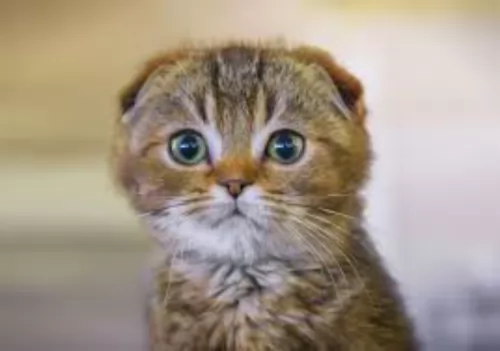 This is a medium-sized cat that weighs between 3 and 6kg. The entire body of this cat is of a rounded nature. The legs are also fairly short.
This is a medium-sized cat that weighs between 3 and 6kg. The entire body of this cat is of a rounded nature. The legs are also fairly short.
All Scottish Fold kittens are born with regular ears but within the first few weeks after birth, the peculiarity with the ears starts to come in. However, some kittens don’t develop folded ears.
The first cats had one fold but with selective breeding, some have 2 or 3 folds or creases so that the ears lie flat against the head. The cat has a round head and large, round eyes. These cats can have a long- or short coat which is thick and soft and the coat can be in a number of colors.
Your Scottish Fold is a good-natured, placid cat and adapts well to different homes and lifestyles. He gets on well with children and pets, becoming just a little bit more attached to the one who feeds him.
He ‘talks’ with quiet meows and purs. They’re playful cats and love to spend time outdoors. A climbing tree and stimulating toys will be a good idea for this energetic feline as he is active and curious. He won’t like being left for long periods though.
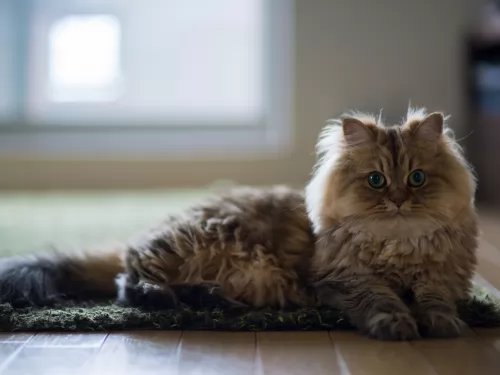 The amicable personality of the Persian cat makes it easy to have these cats in your home. The long hair becomes a bit of an issue as the cat sheds quite a bit.
The amicable personality of the Persian cat makes it easy to have these cats in your home. The long hair becomes a bit of an issue as the cat sheds quite a bit.
They’re sweet, quiet cats and they don’t demand attention from you. They are more than happy just lying quietly in a warm spot. They are calm, loving cats and it's no wonder that they are still such a popular breed of cat.
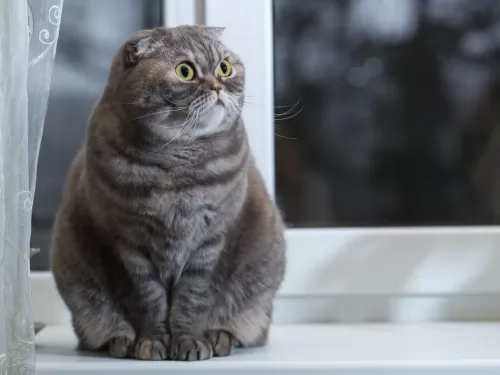 With his big, round eyes, the Scottish Fold has an amicable looking face and he is a friendly calm cat.
With his big, round eyes, the Scottish Fold has an amicable looking face and he is a friendly calm cat.
They love attention and get on well with children and pets who have been trained to be gentle around cats. It is also quite a vocal breed although he 'talks' in a quiet voice.
Because they thrive on pampering and attention, it is better for this cat not to be in a home where the owners are away at work all day.
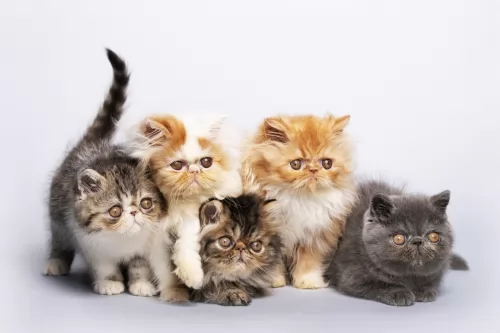 The structure of this cat’s head can mean some health problems. Hereditary Polycystic kidney disease is prevalent with the Persian cat. It is an inherited condition that causes cysts to form in the kidneys. These cysts are actually present from birth, growing larger over time and interfering with kidney function and ending in kidney failure.
The structure of this cat’s head can mean some health problems. Hereditary Polycystic kidney disease is prevalent with the Persian cat. It is an inherited condition that causes cysts to form in the kidneys. These cysts are actually present from birth, growing larger over time and interfering with kidney function and ending in kidney failure.
Also, with a larger breed cat such as the Persian, hip dysplasia is a problem.
Persians are also susceptible to malocclusion which means ‘incorrect bite’. This particular condition can affect the cat’s ability to grasp and actually hold food. So much so in fact, that now pet food manufacturing companies have even developed specially-shaped kibble to cater particularly for the Persian.
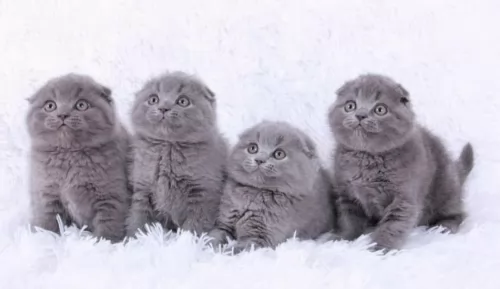 Perhaps one of the things to look out for with these cats is a disease known as osteochondrodysplasia.
Perhaps one of the things to look out for with these cats is a disease known as osteochondrodysplasia.
This is a hereditary disorder of the bones and cartilage. The disease is caused by an autosomal dominant trait and a cat can inherit just one copy of the abnormal gene to have the disease.
Having this disease comes with other health issues and a cat with this disease will be reluctant to jump and may even become lame.
Whenever you suspect anything wrong with your Scottish Fold cat, get him to the vet just as soon as possible.
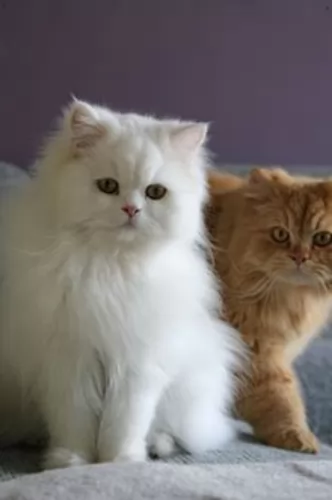 The Persian cat’s coat is long and silky and because he is a fairly heavy shedder, he will require regular brushing – certainly once or twice a week to get rid of that loose hair. It is important to brush and also cut the hair so as to get rid of the tangled knots that form.
The Persian cat’s coat is long and silky and because he is a fairly heavy shedder, he will require regular brushing – certainly once or twice a week to get rid of that loose hair. It is important to brush and also cut the hair so as to get rid of the tangled knots that form.
While brushing your Persian, make sure that his eyes and nose are clear. This is important because the flat face creates problems with these cats.
Excellent cat food for your Persian involves reading labels and understanding what brands are best for your beautiful cat. The Persian cat is a carnivore and will require high-quality food rich in protein.
Speak to your vet if you are in any doubt about the best food for your cat’s health and wellbeing. Make sure your pet has a constant supply of fresh, cool water.
Make sure to keep the litter box clean. Buy a small rake from the pet shop and rake up your cat's feces every single day and dispose of them.
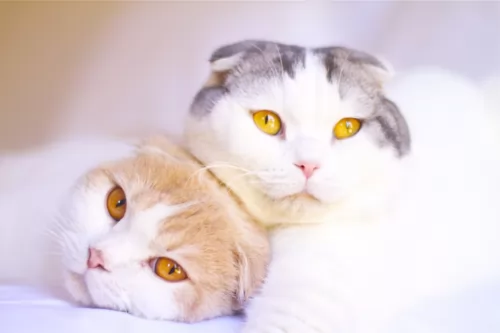 Scottish folds have thick fur and you should at least brush it once a week to get rid of dust and loose hair.
Scottish folds have thick fur and you should at least brush it once a week to get rid of dust and loose hair.
Keep your cat’s nails trimmed otherwise you could get a nasty scratch.
Provide your cat with a climbing tree as well as a scratching post as these are two things – climbing and scratching – that are in the nature of cats.
Provide your Scottish Fold with a litter box and make sure that it is kept clean and that you remove the feces every single day.
Provide your pet with stimulating toys as they are active, intelligent cats.
Protect your cat from fatal cat diseases by having him vaccinated. Your vet will inform you about which vaccines are best. Kittens need vaccines when they are between 6 to 8 weeks old These vaccines come in a series but you don’t have to stress, as the vet will give you a card with the date on which your kitten must return for his next vaccine.
Your Scottish Fold needs to receive the highest quality cat food there is as these foods are balanced with the right amount of vitamins and minerals. When it comes to commercial cat foods, you’ve got choices. You can choose wet or dry food or even combination – something to tempt the fussiest of cats. Cats are carnivores and their food needs to be almost entirely of meat.